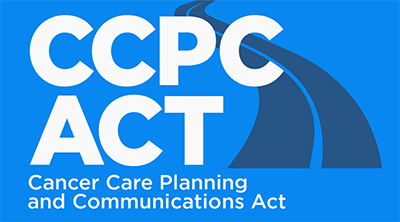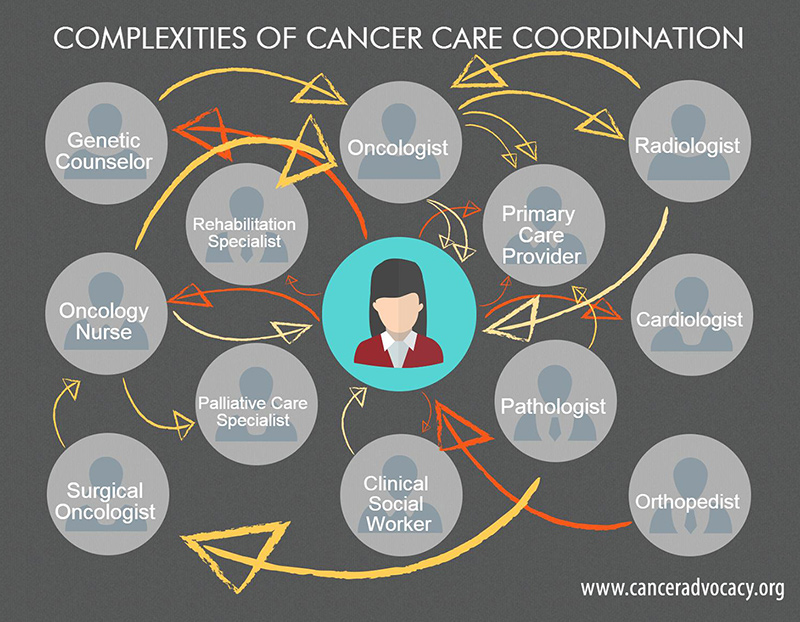NCCS is now Cancer Nation. Find out more about our next chapter. Join Us
Cancer Care Planning and Communications Act (CCPCA)
 Providing Cancer Patients a Plan for Treatment and Survivorship
Providing Cancer Patients a Plan for Treatment and Survivorship
Congressman Mark DeSaulnier (D-CA), a cancer survivor, introduced H.R. 5183, the Cancer Care Planning and Communications Act (CCPCA), legislation to establish a Medicare service for cancer care planning.
Cancer care planning has been identified as an element of quality cancer care for all Americans. The National Academy of Medicine, medical professional societies, and cancer patients have embraced the idea that all patients should receive a treatment plan from the cancer care team.
- Benefit to patients: Provides information patients need to make treatment decisions, coordinates their care, and effectively transition from active treatment to survivorship.
- Benefit to providers: Helps ensure the patient is receiving the right care at the right time, care is coordinated, and resources are used effectively.
- Benefit to the health care system: Ensures appropriate and effective use of cancer care resources and encourages delivery of high-quality, coordinated care.
Most cancer patients still do not receive a written plan that explains their diagnosis, prognosis, treatments, and expected symptoms, leaving them to navigate the complexities of a cancer diagnosis without clear direction or knowing what to expect from their care. Research has confirmed that coordinated cancer care outlined in a written care plan—care that integrates active treatment and symptom management—improves patient outcomes, increases patient satisfaction, and reduces utilization of health care resources.
Pilots don’t take off without a flight pattern, and architects don’t break ground without a blueprint. Patients diagnosed with cancer are taking the journey of their life, literally, so the role of the cancer treatment plan in starting a conversation, in promoting comprehension and retention, in managing expectations and anxiety, and providing continuity across settings and episodes is so important.Participant from previous NCCS workshop on cancer care planning.
What Does CCPCA Do?
CCPCA encourages the development of a personalized cancer care plan for Medicare beneficiaries.
 CCPCA will:
CCPCA will:
- Help cancer patients through the difficult process of cancer diagnosis, treatment choices, treatment management, and survivorship care by supplying them with a written plan or roadmap.
- Promote shared decision-making between patients and their cancer care teams and support informed decisions, as treatment choices are becoming increasingly complex.
- Empower patients with information necessary to help manage and coordinate their care through diagnosis, treatment, and survivorship.
CCPCA was previously introduced as the Planning Actively for Cancer Treatment (PACT) Act in past Congresses, and continues a longtime effort of the National Coalition for Cancer Survivorship to increase cancer care planning implementation throughout the country.
Take Action
Meet With Members of Congress at Home During Recess
NCCS created a step-by-step guide to walk you through the process of setting up meetings with your legislators while they are at home during recess.
Write or Call Your Members of Congress
- To find who your senators are, go to www.senate.gov
- To find who your representative is, go to https://www.house.gov/representatives/find-your-representative.
Write Your Members of Congress
- Find your Member’s website at one of the links above.
- On their website, they should have a “contact” or “email” section.
- Use the sample script below for your message. Feel free to add your own experience or story to the message.
- Email Haley Smoot at hsmoot@canceradvocacy.org to let us know which office(s) you contacted!
Call Your Members of Congress
- Call the Capitol Switchboard at (202) 224-3121 and ask for the Member of Congress you wish to reach.
- When the office answers, ask if you can speak to a staff member who covers health issues.
- Tell them you are calling to ask your Representative/Senator to cosponsor H.R. 5183. Use the sample script below for help.
- Email Haley Smoot at hsmoot@canceradvocacy.org to let us know which office(s) you contacted!
Sample Script
Hello,
I am a survivor/caregiver/advocate from _______. I am calling to ask that Representative/Senator _______ support the Cancer Care Planning and Communication Act, H.R. 5183. The CCPCA would create a new Medicare service for cancer care planning. This care plan would help cancer patients through the difficult process of diagnosis, treatment choices and management, and survivorship care by supplying them with a written plan or roadmap. [As a survivor myself, INSERT BRIEF PERSON CONNECTION TO CANCER, IF APPLICABLE], I understand the importance of shared decision-making between patients and their cancer care teams and this bill would help empower cancer patients with information necessary to help manage and coordinate their care. I hope that your boss will support H.R. 5183, the Cancer Care Planning and Communications Act. Thank you for your time and consideration.
CCPCA Toolkit – Meet Your Members of Congress During August Recess
NCCS created a step-by-step guide to walk you through the process of setting up meetings with your legislators while they are at home during recess.
More About CCPCA
How does CCPCA encourage cancer care planning?
CCPCA would establish a new Medicare service for cancer care planning. A plan can be developed and shared with the Medicare beneficiary at several points in the cancer care continuum, including:
- At the time of diagnosis, for the purposes of planning initial active treatment;
- When there is any substantial change in the condition of the individual, recurrence of disease, changes in the individual’s treatment preferences, or significant revision of the elements of curative care or symptom management for the individual; and
- At the completion of primary treatment for cancer, when the plan may serve as a follow-up survivorship care plan.
Why is a cancer plan necessary for each patient?
In several evaluations of the cancer care system, the National Academy of Medicine (NAM) National Cancer Policy Forum has found that cancer patients rarely receive a plan of care. The NAM has said that patients should receive a cancer care plan because the planning process triggers a solid treatment decision-making process and facilitates the coordination of treatment and supportive care, including management of nausea and vomiting, fatigue, anxiety, and depression.
After patients finish active treatment, they may transition into a different system for survivorship care. These patients require monitoring of the effects of their cancer treatment and for cancer recurrence, as well as follow-up care provided according to recommended schedules. A written plan facilitates the transition to survivorship and the ongoing follow-up that is required.
Why is a new Medicare service necessary?
The Centers for Medicare & Medicaid Services (CMS) has placed a high value on care planning and coordination for all Medicare beneficiaries by establishing the transitional care management service and the complex chronic care management service.
The Oncology Care Model (OCM) was launched by CMS in 2016 and is a step in the right direction for cancer care planning. Medicare beneficiaries treated in one of the 190 OCM practices have access to a treatment plan, but not necessarily a survivorship care plan.
ALL Medicare beneficiaries should have access to this service, not just the ones who receive their care in OCM practices.

